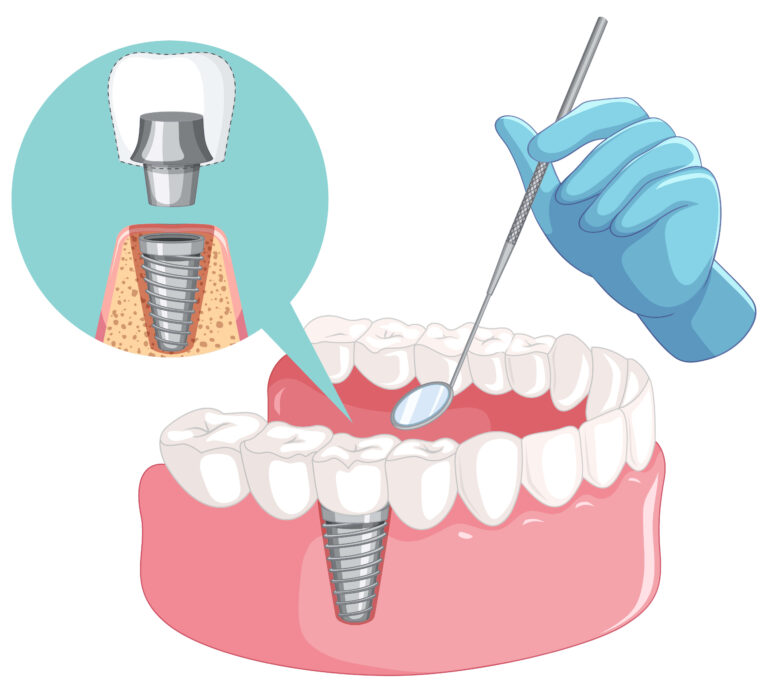
Dental implants offer a long-term solution for replacing missing teeth. They are designed to look, feel, and function like your natural teeth.
What Are Dental Implants?
A dental implant is a small, biocompatible titanium post that is surgically placed into your jawbone, serving as a strong and stable foundation for a replacement tooth, bridge, or denture. Over time, the implant fuses with your bone through a process called osseointegration, mimicking the function of a natural tooth root.
Why Choose Dental Implants?
Dental implants offer unmatched benefits compared to other tooth replacement options:
Natural Look and Feel – Implants are designed to replicate the appearance and performance of real teeth.
Long-Term Solution – With proper care, implants can last a lifetime.
Bone Preservation – Implants stimulate the jawbone, preventing bone loss that often occurs with missing teeth.
No Impact on Adjacent Teeth – Unlike bridges, implants don’t require support from neighbouring teeth.
Improved Comfort and Confidence – Speak, eat, and smile with ease, knowing your teeth are secure and stable.

For patients with one or more missing teeth, dental bridges provide a reliable and aesthetically pleasing solution.
What is a dental bridge?
A dental bridge is a fixed prosthetic used to replace one or more missing teeth. It quite literally “bridges the gap” by anchoring artificial teeth (called pontics) to the adjacent natural teeth or dental implants. Bridges help restore proper chewing, maintain your face shape, and prevent your other teeth from shifting out of alignment.
When are dental bridges needed?
Caring for Your Dental Bridge
Proper care ensures your bridge lasts for 10–15 years or longer:
Brush and floss daily (ask us about bridge flossers and water flossers)
Avoid chewing hard or sticky foods on your bridge
Come in for regular cleanings and exams
Consider a night guard if you clench or grind your teeth

Dentures can be used to replace the function and appearance of your natural teeth, and our dentists ensure that they are comfortable and natural.
What Are Dentures?
Dentures are removable prosthetic appliances that replace missing teeth and the surrounding gum tissue. They are designed to closely resemble natural teeth and restore essential functions like chewing, speaking, and smiling.
What are the advantages of dentures?
There are a number of benefits to choosing dentures to replace your missing teeth.
Adjusting to Life with Dentures
It may take a little time to get used to your new dentures—but we’re here to support you every step of the way.
Start with soft foods and work up to firmer textures
Practice speaking aloud to get used to pronunciation
Clean your dentures daily and soak them overnight
Never use hot water to clean them (it can warp the material)
Dental pain should never be left to wait. If you are experiencing a severe toothache, a broken tooth, a lost filling, or any other urgent dental issue, please contact us as soon as possible. Our team will do everything we can to see you quickly and get you out of pain.
If you have a missing or severely damaged tooth, our team will assess your condition and
recommend the best replacement option, such as a crown, bridge, or dentures, to restore both
function and appearance.
Crowns and bridges can last many years with proper care, while dentures may require
adjustments over time. We'll guide you on how to maintain your tooth replacements for long-
lasting results.
The process can vary depending on the treatment. Crowns and bridges typically take a few
weeks, while dentures may take a bit longer for proper fitting. We'll provide a timeline based on
your specific needs.
Our team ensures your comfort throughout the process, using local anesthesia or sedation if
needed. You may experience mild discomfort after the procedure, but it should subside quickly.
The cost varies based on the type of replacement and your unique needs. During your
consultation, we'll provide a detailed breakdown of the costs involved and discuss payment
options.
Your initial dental appointment is crucial. Expect a thorough examination, including checking your teeth, gums, and overall oral health. The dentist may take X-rays and discuss any necessary treatments or preventive measures. Don’t hesitate to ask questions during this visit.